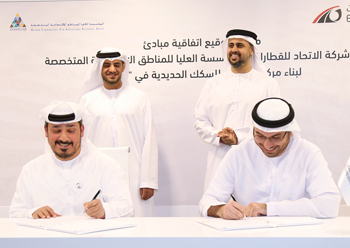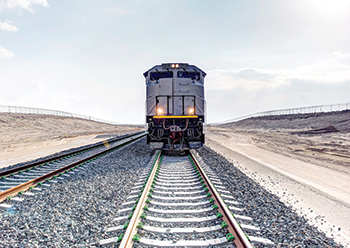Steaming ahead
Etihad Rail is well on its way to realising its vision for the 1,200-km network. In this exclusive report, Gulf Construction elaborates on the contracts awarded on Stage 2 of the UAE rail project, and indicates that the last package is now waiting to be signed off.
01 September 2019
Etihad Rail, developer and operator of the national railway, has awarded the three packages – A, B and C – and is expected to award the contract for the final package in Stage 2 – Package D – later this year.
Package A of Stage Two, awarded in March, runs for 139 km connecting Ruwais with Ghuweifat on the UAE border with Saudi Arabia, and includes a tie-in with the existing Stage One line.
 |
|
Officials sign the deal for Package A, Stage Two, which connects Ruwais with Ghuweifat. |
Stage One of the project, which extends 264 km, was delivered and has been fully operational since 2016, linking the Shah and Habshan gas fields in the Al Dhafra region of Abu Dhabi to the port of Ruwais on the Arabian Gulf. It transports sulphur from sources at Shah and Habshan to the export point at Ruwais.
Packages B and C were awarded in June. Package B will stretch 216 km connecting Tarif to Saih Shuaib, and includes trackwork to support works at Industrial City of Abu Dhabi (ICAD), Khalifa Port and Khalifa Industrial Zone Abu Dhabi (Kizad); while Package C will run for 94 km connecting Jebel Ali to Sharjah, and will include trackwork within the Jebel Ali Freight Terminal.
The contract for Package A, valued at Dh1.5 billion ($408.441 million), was awarded to a joint venture between China State Construction Engineering Corporation and South Korea’s SK Engineering and Construction. The scope of work covers the design and construction of rail infrastructure, including earthworks, bridges, tunnels, animal crossing, track-laying, and linking with Stage One of the network at Ruwais.
Contracts for Packages B and C, worth a total of Dh4.4 billion ($1.198 billion), were awarded to the China Railway Construction Corporation and Ghantoot Transport & General Contracting. The scope of work for these packages comprises civil and track works, design and construction of rail infrastructure, including earthworks, bridges, tunnels, animal-crossings and track-laying, connecting Package B with Package A (Stage One at Tarif), and Package C with Package B.
 |
|
Etihad Rail signs the deals for Packages B and C with China Railway Construction Corporation and Ghantoot Transport & General Contracting. |
Package D, which is yet to be awarded, extends 132 km from Sharjah to Fujairah, and will provide connectivity to the Port of Fujairah and to Package C from the Dubai/Sharjah Border. It will pass through the emirates of Sharjah, Fujairah and Ras Al Khaimah. The majority of the alignment for this package will pass through the Hajar Mountains.
The package also includes freight facilities and rail systems including signalling.
Of all the packages in Stage 2, Package D is the most challenging as it passes through the Hajar Mountains – the highest mountain range in the eastern Arabian Peninsula – calling for the excavation of tunnels and construction of structures such as rail underpasses, underbridges, viaducts and overbridges, a source familiar with the matter tells Gulf Construction.
Work on Stage 2 is currently in the detailed design phase. While the completion date of this stage will be set only once ground has been broken, the massive scale of work involved under the various packages of Stage 2 can be gauged from the statistics drawn up by the material moved or used. The first three packages alone will involves 89 million tonnes of earthworks and excavation; and require 2.25 million cu m of ballast, and 1.393 million concrete sleepers.
Etihad Rail’s state-of-the-art network is being built to globally accepted standards, and will improve the way goods and people are moved, opening up new trade corridors and journey opportunities. The railway provides faster, cheaper, safer and more regular logistic services to the industrial sector.
When complete, the 1,200-km Etihad Rail project will link the UAE’s principal centres of industry, manufacturing, production, population, and import/export points, forming an integral part of the GCC-wide railway network.
 |
|
Etihad Rail signs the agreement with Zones Corp. |
In its initial stages, the railway network will focus on freight movement. However, the company is working with key government stakeholders to develop a passenger network that will service the needs and requirements of the country, thus increasing the economic and social benefits of the railway.
The network is mainly double track, of standard gauge, designed for mixed-use traffic, equipped with an in-cab European signalling system (ETCS Level 2), and is being built to accommodate double stack containers. The same specifications are being applied to other GCC railways to facilitate interconnectivity.
Etihad Rail is amongst the first in the world to use the European signalling system (ETCS Level 2), according to the source.
ETCS Level 2 offers a wide range of benefits including safety. The system allows for continuous monitoring of train movement and track occupancy, maintains safe braking distances, and removes the risk of human error as it automatically applies brakes if the driver fails to respect railway movement authority.
This signalling system enhances capacity by reducing headways, allowing higher operations speeds. It boosts capacity by 40 per cent as compared to conventional signalling system. The system significantly increases reliability and punctuality, which is crucial for both freight and passengers.
ETCS Level 2 also helps reduce maintenance cost by doing away with line-side physical signals and associated cablings.
The proven technology allows for interoperability between suppliers and between countries and has been selected as the main railway signalling system for the GCC region.
This signalling system also contributes to the sustainability benefits that Etihad Rail will bring to the UAE as by boosting capacity, freight transportation by road haulage trucks is reduced, resulting in lower carbon emissions.
The source adds that the environmental benefits that will result from the national railway network will be game changing.
One fully-laden freight train trip on Stage One can replace approximately 300 trucks on the road, thus reducing congestion and improving safety. Additionally, a fully-loaded train also produces up to 70 to 80 per cent less carbon dioxide emissions than trucks moving the same tonnage.”
Rail transport also lowers the cost of trade and improves the market position of existing industries, promoting their growth and leading to economic diversification through the creation of a new transport infrastructure and its related ecosystem.
Among other recent deals, Etihad Rail also signed an agreement with Abu Dhabi Ports to connect Khalifa Port to the national railway network, and another with the Higher Corporation for Specialized Economic Zones (Zones Corp) aiming to build a logistics centre and railway depot in ICAD.
- Stimulating growth
- Abu Dhabi projects at a glance
- Steaming ahead
- Unique destination
- First residents move into Azure Al Reem
- Meva systems help shape residential tower



